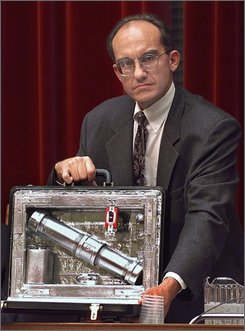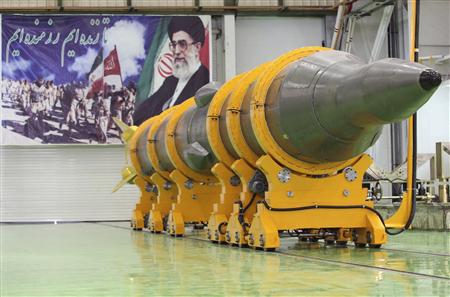 Nanotechnology (“nanotech”) is the science of controlling matter on a molecular scale, usually sized between 1 and 100 nanometers. How small is that? Well, since 1 nanometer is roughly 1/50,000th the width of a human hair, maybe “mind-bogglingly tiny” is a better way of putting it.
Nanotechnology (“nanotech”) is the science of controlling matter on a molecular scale, usually sized between 1 and 100 nanometers. How small is that? Well, since 1 nanometer is roughly 1/50,000th the width of a human hair, maybe “mind-bogglingly tiny” is a better way of putting it.
The ability to manipulate matter this minuscule has big implications for the future of healthcare, manufacturing, defense and a wide range other applications.
However, like every powerful new technology, there are dangers. For years, people have been calling on the government to pass stricter nanotech laws, and most recently the Nanotechnology Safety Act of 2010 bill was introduced, which seeks to regulate nanotech used in medicine and food.
Worry over nothing?
But is all this worry warranted? Could nanotech really do that much harm? It’s difficult to say, but if nanotech really does fundamentally change the world like some are claiming, the dangers are far more grave than most could ever imagine. For a look into some worst case scenarios, The Center for Responsible Nanotechnology has released a list of nanotech dangers. Five of them are listed below, and they all could end the world as we know it.
1) Grey goo
The “gray goo” scenario is when self-replicating, organic-matter-eating nanobots replicate uncontrollably consuming everything around them, leaving only gray goo and death in their wake. Picture this – there’s a massive oil spill Gulf of Mexico just like the recent BP spill, except instead of using booms and chemical dispersants to clean it up, crews pour nanobots into the water that self-replicate and feed on oil. But something goes wrong. The nanobots start feeding on more than oil. They eat everything. Soon they move to land and don’t stop replicating or eating until nothing is left on Earth but a grey goo waste that the nanobots leave behind.
2) Terrorism
A microscopic bit of certain substances (like botulism toxin) is all that’s required to kill a human. Nanotech “insects” with tiny needles for injecting humans could also be made on a mass scale. Combine the two and you have enough tiny bug assassins inside a suitcase to kill every person on Earth. And unlike nuclear weapons, there wouldn’t need to be huge factories to accomplish this, nor would smuggling nanotech weapons be difficult.
3) Arms race
With nuclear weapons the possibility of nuclear winter and mutually assured destruction kept threats high, but actual use of nuclear weapons low. With nanotech weapons, there won’t necessarily be environmental fallout, and the weapons could be hyper targeted. With this kind of precision and low collateral damage, governments could be more tempted to use nanotech weapons and preemptively attack those who might attain them. This will make attaining nanotech weapons imperative for every country wishing to defend itself. Even worse, through use of nanotech “bugs” and the like, it might be possible to assassinate world leaders without leaving a trace.
4) Environmental damage (“nano-litter”)
Just like any new technology, nanotech presents environmental problems. Nanotech robots could feed on organic matter, produce waste and replicate themselves on a massive scale. Or plain nano-waste could simply junk up soil or water supplies. It doesn’t take much imagination to see how this could have horrible implications for the environment and health. Without environmental regulations that are adapted to nanotech, companies could easily harm the environment, perhaps doing irreparable harm.
5) Social upheaval
If nanotech factories come to pass, that means people could potentially manufacture anything cheaply and easily in their own homes, including dangerous or illegal items. In turn, world governments’ ability to regulate drugs and weapons could become weaker than it already is. Society could break down in the face of governments’ complete inability to control the flow of contraband, or as a response to perceived government infringement of liberty if authorities ham handedly try to assert their authority. For highly religious societies, the proliferation of “immoral” items could prompt an anti-technology revolution that divides the world more than it already is.
The future
With the pace of technological advancement ever accelerating, you might be surprised at what comes to pass. Then again, nanotech could wind up being a big disappointment, much like those flying cars from the future that never seem to materialize. In any case, you can bet the debate about regulating nanotech will only heat up as more people become aware of its power to change the world.
Your thoughts?










8 comments
Max
We should have no nanotechnology at all, it will kill us.
brynda beeman
I have a condition that seems to be non exsistant, as far as doctors are concerned.The popular name for it is Morgellons. Some say theorize that it may be caused by a nanotechnology experiment that got loose. Others say that it has been purposely let loose on us unsuspecting citizens. I don't know if this is true, but I know that I suffer every day. Many people who have this disease are told they are delusional. My own experience has been that most doctors dismiss my symptoms without even looking, others say it is stress, and others say there is nothing that they can do for me. My health continues to decline, I have lost my job, many days I don't have the strength to even do normal household chores....is it nanotechology, is it all in my head...I don't know, all I do know is that I am suffering and my government (CDC), just continues to drag their feet. Anybody that has any knowledge or wants to help the thousands of victims of this disease please, please let us know.
hmmm
I think you should look into electroshock therapy. Surely the ESD would disable the bots or your lunacy ... win win.
To Hmmmmm
Reg" the B.B Morgellons post.
Stepped out to walk my dog 3 months ago and received multiple "electrical' feeling sharp sting/zaps all over my body Went back into house and thought "what the ___ was that?" Not another thought. 3 months later and I too have been living the absolute nightmare of what I've now found is called Morgellons. And my road has just begun.
Google Jan Smith Morgellons and find the more serious (not the art page) with microscopic images glowing forms,hexagons,pseudo insects, coming out of sufferers sores,pores etc. The CDC has been dragging its feet for years on this after originally handing off to the Army.
This is a multi-systemic disease that is killing us.
Scientists with conscience PLEASE step forward and help us! p.s also Google Living with Morgellons" for a taste of what people are suffering through.
From "Living in a sudden nightmare"
Zincorium
The more advanced nanotechnology gets, the more it looks like 1, 2 ,3, and 5 just aren't ever going to be practical. 4 dramatically overblown, nanowaste is going to be fairly similar to existing pollution, and existing methods of safely disposing of it should work at least as well.
Nanotechnology is the new genetic engineering or radiation, with the same bogus, unfounded fears of it's applications.
Or have you been attacked by half human/half ants recently and failed to inform us?
Nanofan
I look forward to #5. I think the ability to cheaply produce anything with zero loss of material would force a paradigm shift in our cultures that is long overdue. Yeah it'll suck balls to have 99% unemployment but we can make anything we really need. The trick is what to do with all our free time. What really gives you purpose? We have all been raised to think that it's our jobs, but what if the only job we had to do was to do what we really love to do for the love of it and not the money.
As for the environmental issues. I have no doubt that any waste produced could also be cleaned up by the same little bots that produced it. Compared to today's technology the waste of nano production would be very minimal if extant at all.
The other three problems are pretty solid. We're all gonna die. Upload your brain to a computer as soon as the technology makes it available.
Mike
The above post about #5 reminds me of Rossum's Universal Robots, in which the robots were adapted into soldiers, and then revolted upon those that created them. We human beings would be considered a parasite to the nanobots themselves and be wiped out
ArkAngel
Your free time will be consumed by an infinite dirt nap. Take a deep breath dreamer.